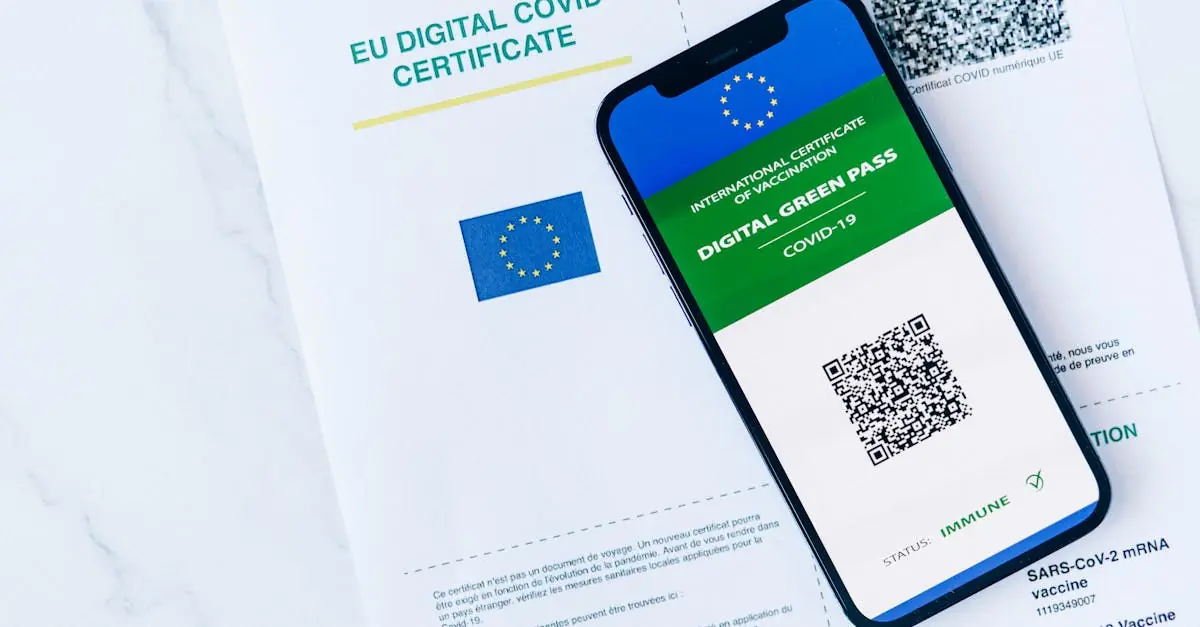In a world where swiping right can lead to love and swiping left can get you ghosted, identity verification apps are the unsung heroes keeping the digital dating scene—and everything else—safe. Imagine your phone as a bouncer at an exclusive club, turning away the shady characters while letting in only the VIPs. With the rise of online interactions, these apps have become essential tools for ensuring that the person on the other side of the screen is who they claim to be.
From securing your financial transactions to verifying new acquaintances, the right identity verification app can save the day. With a plethora of options available, choosing the best one can feel like finding a needle in a haystack. Fear not! This guide will spotlight the top identity verification apps for mobile that combine security with user-friendliness, ensuring peace of mind without sacrificing convenience.
Table of Contents
ToggleOverview of Identity Verification Apps
Identity verification apps play a vital role in online safety. They help users confirm identities in various scenarios, especially in dating and financial transactions. A range of features enhances their efficacy, including biometric authentication and document scanning.
Biometric authentication utilizes fingerprint recognition or facial recognition. Both methods increase security by ensuring that only authorized individuals can access accounts. Document scanning allows users to upload government-issued ID cards or passports, making the verification process straightforward.
Users benefit from a variety of identity verification apps in the market. For example, apps like VeriFly focus on travel-related authentication, ensuring travelers meet safety regulations. Another popular choice, IDnow, caters to businesses needing identity verification for financial services.
Mobile app designs emphasize user-friendliness. Many identity verification apps streamline processes to reduce friction during user interactions. Seamless integration with existing platforms enhances accessibility, allowing users to verify identities without extensive navigational hurdles.
The effectiveness of these applications relies heavily on advanced technology. Machine learning algorithms analyze user data and detect potential fraud. This constant assessment strengthens security measures and builds user trust.
Overall, selecting a suitable identity verification app involves weighing factors such as security features, ease of use, and specific use cases. Comprehensive options ensure users find a solution that fits their unique requirements.
Features to Consider
Identity verification apps provide various features crucial for a seamless and secure user experience. Understanding these aspects helps users choose the right application.
User Experience
User experience significantly impacts how individuals interact with identity verification apps. Intuitive layouts and clear instructions enhance navigation and make the verification process quick. Quick load times enable users to minimize waiting periods. Providing tutorial guides or walkthroughs can assist first-time users in comprehending features. Users tend to prefer applications that allow easy access to help or support. Options like push notifications for updates improve engagement and keep users informed throughout the verification process.
Security Measures
Security measures play a vital role in protecting sensitive user information. Robust encryption methods safeguard data both during transmission and storage. Multi-factor authentication adds an additional layer of security, requiring users to verify identities through multiple steps. Regular software updates and vulnerability assessments help maintain app security against emerging threats. Biometric authentication features, such as fingerprint or facial recognition, provide an enhanced level of security while being user-friendly. Users benefit from apps that prioritize compliance with data protection regulations and best practices.
Integration Options
Integration options facilitate the connection of identity verification apps with other platforms. Compatibility with existing systems, such as databases or customer management software, streamlines processes. Popular applications support APIs, enabling businesses to incorporate identity verification directly into their workflows. Users appreciate seamless integration, which minimizes disruptions and enhances efficiency. Options for third-party integrations, like payment processors or communication tools, further enhance usability. Flexibility in integration ensures that all parties benefit from a well-rounded user experience.
Top Identity Verification Apps for Mobile
Mobile identity verification apps play a crucial role in enhancing online security. These applications streamline the process of confirming identities for various purposes, from dating to financial transactions.
App 1: Description and Features
VeriFly offers a seamless experience for users needing travel-related identity verification. It allows individuals to provide health-related information, such as COVID-19 test results, before reaching their destinations. Users can access documents via a secure mobile interface, ensuring convenience. Biometric authentication simplifies the sign-in process, enhancing security. Integration with travel-related platforms boosts its usability, making it an excellent option for frequent travelers.
App 2: Description and Features
IDnow specializes in serving businesses that require efficient identity verification for financial services. This app employs advanced technologies like facial recognition and document scanning to authenticate users quickly. Multi-factor authentication adds an additional layer of protection. The user-friendly interface caters to various industries, allowing businesses to maintain compliance with strict regulations. Continuous software updates ensure the app stays secure against evolving threats.
App 3: Description and Features
Jumio is designed for comprehensive identity verification that caters to diverse industries. Its capabilities include scanning government-issued IDs and leveraging machine learning for fraud detection. Users experience fast processing times, which enhances the overall transaction speed. The app’s robust security measures, including encryption, safeguard sensitive information during authentication. Integration with existing platforms ensures a seamless user experience, making it a popular choice among businesses.
Benefits of Using Identity Verification Apps
Identity verification apps offer numerous advantages that enhance online interactions. One primary benefit includes improved security. Users can rely on biometric authentication features like fingerprint recognition or facial scans, which bolster protection against fraud.
Another significant aspect is convenience. These applications streamline the verification process, allowing users to confirm identities quickly, whether for dating or financial transactions. Integration with features like document scanning simplifies user experiences by reducing the need for manual input.
Enhanced efficiency also characterizes these apps. Users benefit from seamless integration with existing platforms, making it easier to engage with services. Fast verification times contribute to maintaining engagement and satisfaction during online interactions.
Cost-effectiveness presents another advantage. Many identity verification apps provide competitive pricing models while offering comprehensive services. Businesses and individuals gain access to reliable identity confirmation without incurring high costs.
Companies looking to protect sensitive data find value in robust encryption methods. Multi-factor authentication employed by these apps further safeguards user information, enabling trust in online communications. Regular software updates ensure ongoing compliance with data protection regulations.
Various industries benefit from the application of advanced technology as well. Machine learning algorithms detect fraud patterns, enhancing overall security measures. As a result, businesses can reduce risks associated with identity theft.
Overall, the combination of multiple features fosters confidence in online engagements. Users experience reassurance knowing they can verify identities swiftly and securely, leading to safer digital environments.
Choosing the right identity verification app can significantly enhance online safety and trust. With options like VeriFly, IDnow, and Jumio, users can find tailored solutions that meet their specific needs. These apps not only streamline the verification process but also incorporate advanced technologies to safeguard personal information.
As digital interactions continue to rise, investing in a reliable identity verification app becomes increasingly essential. By prioritizing security features, user experience, and seamless integration, individuals can confidently navigate online engagements. Embracing these tools empowers users to protect themselves and foster trustworthy connections in an ever-evolving digital landscape.






